Library of Congress's Blog, page 185
July 27, 2012
Let the Games Begin!
Tonight the 2012 Olympics in London kick off. The excitement has certainly been building all year as enthusiasts have followed the torch relay and
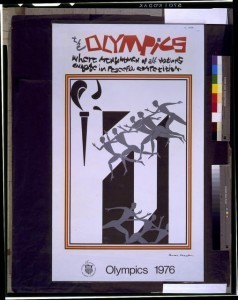
Olympics 1976 by Romare Bearden / Prints and Photographs Division
participating athletes and teams. I can admit that the games probably appeal to me for a few other different reasons than purely anticipating all the awesome competition.
First, my favorite band, MUSE, not only participated in the torch relay but also contributed one of five official songs for this year’s summer games. They are supposedly performing in tonight’s opening ceremony.
Second, it was announced earlier this month that roller derby is one of the contenders to be included in the 2020 games. As a player and enthusiast, this makes me beyond excited. And, trust me, the sport already has Olympic-worthy athletes. Roller sports, which would include roller derby, was actually on the list of sports considered for the 2012 Summer Olympics but didn’t make it, along with squash, karate, golf and rugby sevens. However you can catch a glimpse of derby, somewhat, in tonight’s opening ceremony, as the London Roller Girls are participating.
This year’s summer games include 26 sports, including archery, rowing, tennis, shooting and water polo. And some of these sports are further broken down into disciplines. For example, cycling includes BMX, mountain biking, road and track. For the first time, women’s boxing is also being included.
Until 1992, both the summer and winter games were held in the same year. Since then, they have been held two years apart. The original Olympic Games were first recorded in 776 B.C. in Olympia, Greece, and were celebrated until A.D. 393. The ancient stadium in Olympia could accommodate more than 40,000 spectators, while in the surrounding area there were auxiliary buildings that developed gradually up until the 4th century B.C. and were used as training sites for the athletes or to house the judges of the games. The ancient Olympic Games included running, jumping, the discus throw, wrestling, boxing and equestrian events.
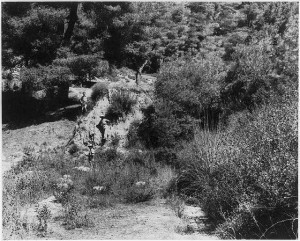
Olympia, the site of original Olympic Games / Prints and Photographs Division
Interest in reviving the Olympic Games was first shown by the Greek poet and newspaper editor Panagiotis Soutsos in his poem “Dialogue of the Dead” in 1833. Evangelos Zappas sponsored the first modern international Olympic Games in 1859. The International Olympic Committee (IOC) was founded in 1894 on the initiative of French nobleman Pierre Fredy, Baron de Coubertin. The first of the IOC’s Olympic Games were the 1896 Summer Olympics held in Athens.
The Library holds a range of materials on the Olympic Games, and you can find them through this guide to reference sources.
Searching the Prints and Photographs Division Online Catalog for “Olympic Games” turns up images from games in Berlin, Rome, Tokyo, Mexico City and Moscow. You can also search for early 20th-century newspaper articles featuring Olympic headlines in Chronicling America.
Want to know a little more about the United Kingdom, from a map’s perspective? The country is featured as part of this month’s Places in the News.
Make sure to check out what the other Library blogs are posting on the subject, including highlighting the London games then and now, Olympic laws, athlete Jesse Owens, Olympic poetry and the now-discontinued sport of tug of war.
July 26, 2012
Legal Cleanup on Aisle 4!
If someone set a bowl of cheese curls in front of you and declared it “breakfast,” would you be able to discern it from cereal?
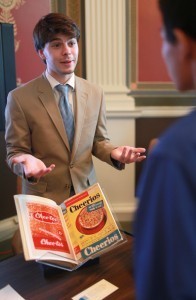
Wesley Verge explains the case
Even if you’re the type who likes cold pizza at 7 a.m., odds are you would not be too quick to pour on the milk and dive in with a spoon. But today, at the Library of Congress, team members of the Library’s Junior Fellows Summer Interns class of 2012 assigned to the Law Library laid out the 1952 trademark dispute between the Frito Co. (now known as Frito-Lay) and General Mills, the maker of the breakfast cereal Cheerios.
The Law Library fellows were among 38 such interns working in more than 20 Library divisions for 10 weeks this summer, creating archival finding aids, organizing elements of collections and in the process finding more than 130 interesting items, ranging from an opera notated in unorthodox fashion – with curved staffs – to a previously unknown demo recording by blues legends Sonny Terry and Brownie McGhee.
Back to our food fight. The Frito Co.’s owners had created “Chee-tos,” a cousin to their popular snack food, Fritos. Both involved corn as the basis, but Chee-tos, as the name suggested, also contained cheese.
The Frito Co. applied for a trademark, but was halted by a protest from General Mills, which suggested that the similarity between the two product names (both involving “chee” and “o”) constituted infringement of the existing Cheerios trademark. The U.S. Court of Appeals for the 5th Circuit barred the Frito Co. from trademarking Chee-tos.
It wasn’t over, according to Junior Fellow Mari Gavin of Richmond, Va., a graduate of the College of William & Mary who’s applying to law school. (Fellow fellow Wesley Verge also was instrumental in unearthing the Chee-tos case.) Two more rounds of appeals later, the Frito Co. won its trademark, which is why we are all munching both (trademarked) food products lo these many decades later.
Among their many accomplishments, this year’s crew of Junior Fellows detailed the provenance of a rare book of fables in the Library’s Lessing J. Rosenwald Collection
of rare books; organized the Library’s collection of operas written since 1990; worked to bring voice recordings of major poets to the Library’s website; and added descriptive detail to items being placed on the World Digital Library website. They found fun and fascinating elements in the Copyright collections and preserved fragile maps.
Some of the fellows will go to graduate school, others will return to undergraduate school or scout for jobs; but some were fascinated enough by their weeks at the Library to consider careers in librarianship – for which we can all be grateful.
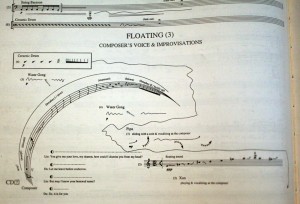
Tan Dun opera music with curved staffs
July 25, 2012
Words to the Wise
“Look before you leap.”
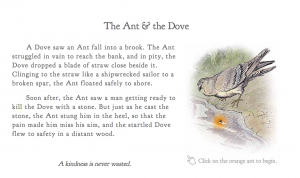
"The Ant & the Dove"
“Do not believe everything you hear.”
“A kindness is never wasted.”
“Heaven helps those who help themselves.”
“You are judged by the company you keep.”
Sound familiar? Sage advice given to you at one time or another likely by your parents or other loved ones, right? I know I can hear my mom’s voice right now offering up these words of wisdom when I was a kid. Well, as much as I know we’d like to give our folks the credit, these lessons can be traced back to Aesop, a Greek slave and storyteller thought to have lived between 620 and 560 B.C. His “Aesop’s Fables,” an ancient collection of 147 stories designed to teach moral lessons, are some of the world’s best known and have been translated into multiple languages and become popular in hundreds of cultures.
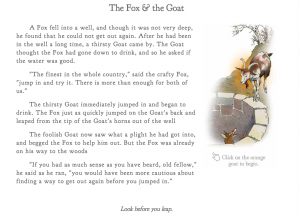
"The Fox & the Goat"
The Library of Congress has released “Words to the Wise: The Aesop’s Fables e-Book,” an interactive version of the classic Aesop tales, featuring the colorful illustrations of artist Milo Winter. The free e-book is available on the Library’s read.gov website and as a free app for the iPhone, iPad and Android platforms.
The interactive e-book is adapted from the 1919 book “The Aesop for Children: With Pictures by Milo Winter,” published by Rand, McNally & Co. Winter’s pictures have been transformed for this e-book, and now readers can interact with the charming illustrations to see and hear them move: a choosy heron eyes the fish swimming at his feet, a sly fox swishes his tail, a mouse chews a rope and frees a lion in straits.
The fables remain a popular choice for moral education of children today. Younger scholars will be able to trace the origin of aphorisms such as “sour grapes” and “a bird in the hand.”
What fables do you remember as a child?
July 24, 2012
Lost at Sea
Today, on what would have been Amelia Earhart’s 115th birthday, news reports are trending about a recent expedition to discover what truly happened to the famed aviator on July 2, 1937, when she and Fred Noonan mysteriously disappeared over the Pacific Ocean.
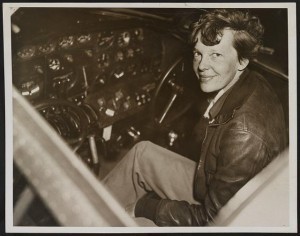
Amelia Earhart / Prints and Photographs Division
A $2.2 million expedition that hoped to find wreckage from the famed aviator’s final flight is on its way back to Hawaii without the dramatic, conclusive plane images searchers were hoping to attain.
The group leading the search, The International Group for Historic Aircraft Recovery (TIGHAR), believed that Earhart and Noonan landed on a reef near the Kiribati atoll of Nikumaroro, then survived a short time. Previous visits to the island recovered artifacts, and the group speculated a 1937 photo of the shoreline could include what appeared to be portions of Earhart’s Lockheed Electra plane. They set off earlier this month from Honolulu for a week-long expedition.
No big shiny silver airplane, obvious to all, but the data on the various storage devices may hold treasures, the group’s blog said.
While TIGHAR’s expedition didn’t uncover concrete evidence, the group still believes Lady Lindy and her navigator crashed off a remote island in the Pacific and is planning another voyage for next year, which would be its 10th effort towards discovering the truth of the disappearance.
The digital collections of the Library of Congress contain a wide variety of material associated with Amelia Earhart, including manuscripts, photographs and books. This handy guide compiles all the available resources pooled from several Library divisions and collections.
July 17, 2012
In Retrospect: June Blogging Edition
Here’s a roundup of what’s been going on in the Library of Congress blogosphere in June.
In the Muse: Performing Arts Blog
“How to Find Your Snooky Ookums: A Guide to the Irving Berlin Collection”
Pat Padua presents a guide to the Irving Berlin Collection.
The Signal: Digital Preservation
“Every Format on the Face of the Planet”
Leslie Johnston talks about the challenges of digital preservation.
Picture This: Library of Congress Prints & Photos
“Caught Our Eyes: On the Head of a Pin”
Kristi Finefield gives insight on a recent discovery.
In Custodia Legis: Law Librarians of Congress
“The Show Outside the Supreme Court – Pic of the Week”
The Supreme Court rules on the constitutionality of the Patient Protection and Affordable Care Act.
Teaching with the Library of Congress
“Blog Round-Up: Political Cartoons”
Take a look at some previous blog posts offering help on using political cartoons in the classroom.
Inside Adams: Science, Technology & Business
“Transit of Venus: The Unsung Heroes”
Guest blogger Sten Odenwald of NASA discusses the planet Venus.
From the Catbird Seat: Poetry & Literature at the Library of Congress
Seven poetry books are included in the Library’s “Books That Shaped America” list and exhibition.
Copyright Matters: Digitization and Public Access
“Quiet But Not Quiescent: Steady Progress on Several Fronts”
Mike Burk gives an update on Copyright Office business.
July 13, 2012
Felix! Who Knew?
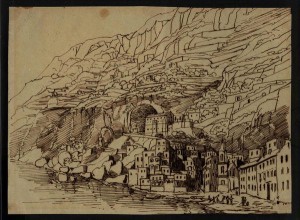
Mendelssohn's pen-and-ink of the Amalfi Coast
If Felix Mendelssohn Bartholdy – the creator of the much-loved Violin Concerto in E Minor, the “Italian Symphony” and “The Hebrides,” aka “Fingal’s Cave” – hadn’t made it so big as a composer, we might well be remembering him today as an artist. Who knew?
You can listen to the Wedding March from the incidental music to Mendelssohn’s “A Midsummer Night’s Dream on the Library’s online National Jukebox; there also you will find his well-known “Spring Song,” and a choral version of the Christmas carol “Hark! The Herald Angels Sing,” adapted by William Hayman Cummings from a tune found in Mendelssohn’s cantata “Festgesang.”
In addition to original manuscripts including songs, choral psalms, piano works, a string octet and two “Lieder ohne Worte” (songs without words) by Mendelssohn (1809-1847) in the Library’s collections — along with numerous pieces of correspondence in his own hand — the Library has two pieces of remarkable art by the young Felix.
One is a pen-and-ink sketch of the Amalfi coast of Italy (from the Library’s Rosaleen Moldenhauer Memorial Archive); the other is a watercolor of the Leipzig Gewandhaus, where he conducted a program in 1836 that included a singing performance by soprano Henriette Grabau. Scholars believe he may have given her the watercolor, in memory of that event, as a wedding present. The watercolor is in the Gertrude Clarke Whittall Collection in the Library’s Performing Arts Reading Room on Capitol Hill.
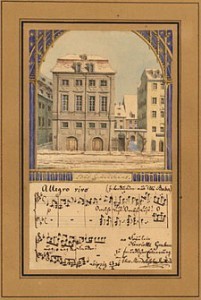
Mendelssohn watercolor of the Gewandhaus
So the next time you’re listening to Mendelssohn’s Italian Symphony, you can feast your eyes as well as your ears!
To learn more about Mendelssohn collections at the Library of Congress, look here.
July 12, 2012
Pic of the Week: And the Kluge Prize Goes To …
Fernando Henrique Cardoso, one of the leading scholars and practitioners of political economy in recent Latin American history, received the 2012 John W. Kluge Prize for lifetime achievement in the study of humanity in a special ceremony Tuesday at the Library of Congress.

Librarian of Congress James H. Billington presents the 2012 John W. Kluge Prize to former Brazil President Fernando Henrique Cardoso. / Abby Brack Lewis
“I feel honored, and humbled, to receive this most prestigious prize. I must confess to you that I also feel a bit nervous, perhaps overwhelmed,” he said in his remarks. “This may sound slightly ridiculous, coming from someone who was the president of Brazil for eight years, and who spent many decades lecturing at universities in the United States, France, Latin America and in my own country. But I insist that it is true.”
Much of Cardoso’s legacy has been one in defiance of conventional wisdom, whether with respect to race relations, the relationship among key structures within the economy, or integration into the world economic system. Under his presidency, he transformed Brazil from a military dictatorship with high inflation into a vibrant, more inclusive democracy with strong economic growth. Perhaps the strongest evidence of his intellectual accomplishment is that his successors have continued so many of his policies and ensured his legacy as one of Brazil’s greatest leaders.
“How did this transformation occur? How did Brazil and other emerging countries overcome many of their problems, and give rise to a new order?” he asked in during his remarks. “How did a sociology professor born in Rio de Janeiro, into an impoverished and overwhelmingly illiterate country in the grip of a Great Depression, come to stand before you tonight – in these hallowed halls of the United States Congress?”
At 17, Cardoso admitted he already wanted to change the world and, more modestly, Brazil. He went on to become a sociologist, researching and working on issues of race in Brazil.
“In ensuing years, the topics of my research would change. But the objectives never did: I wanted to understand what was happening in contemporary Brazil,” said Cardoso. “I wanted to tear down myths and expose truths – on both “left” and “right.”
His political career began as a deputy senator for Sao Paulo, then as senator until his election as president. During his tenure, he confronted inflation by introducing another new currency, called the “real,” implemented compensatory policies to address racial inequalities and progressive policies on AIDS prevention and land distribution that would address the needs of the poorest members of society, broke monopolies and privatized some state companies, and made progress in the areas of universal education and health care.
“Looking at the world today, the challenges and problems facing all of us are in many ways familiar to me,” Cardoso concluded. “Experience has taught me to be optimistic. Brazil’s example shows that even a country deemed ‘hopeless’ can reverse its fortune quickly. I hope that people will look at the Brazilian experience and realize the importance of tolerance and diversity.”
You can read the rest of Cardoso’s remarks here.
July 10, 2012
Library in the News: June Recap Edition
June marked a pretty busy time here at the Library of Congress with some big-ticket announcements. From naming a new Poet Laureate and pivotal books in America’s history to recent collection acquisitions, the institution was making regular headlines.
In announcing Mississippi native and Pulitzer Prize-winning Natasha Trethewey as Poet Laureate, Librarian of Congress James H. Billington told the , “We’re not necessarily on some kick to find a younger poet. The more I read of it, American poetry seems extremely rich in diversity, talent and freedom of expression, and she has a voice that is already original and accomplished. I have an affinity for American individuals who are absolutely unique, and I think that this is one.”
“You know, when you win the Pulitzer, people tell you that you now know what the first line of your obituary will be,” Trethewey told The Atlanta Journal-Constitution. “When I met with the people at the Library of Congress a few weeks ago, they told me now you know the line that will replace that Pulitzer line.”
Trethewey told the Biloxi Sun Herald that many of her influences have themselves been poets laureate, including Robert Penn Warren, Rita Dove and Philip Levine.
Other major outlets running stories included PBS NewsHour, NPR, the Associated Press, Los Angeles Times, USA Today and Reuters.
In addition to naming Trethewey as the 19th poet laureate, the Library gave a shout out to great literature by naming 88 “Books That Shaped America” (also featured in a current exhibition).
“Happily, the Library of Congress’s latest exhibition, ‘Books That Shaped America,’ ignores the familiar high-culture shibboleths and embraces cook-books (Irma Rombauer’s ‘The Joy of Cooking’) and schoolbooks (McGuffey’s ‘Primer’), mysteries (Dashiell Hammett’s ‘Red Harvest’) and science fiction (Ray Bradbury’s ‘Fahrenheit 451’), political tracts as well as poetry, both Dr. Seuss and Dr. Spock,” wrote Michael Dirda for The Washington Post.
John Cole, director of the Library’s Center for the Book, told Roll Call, “ We want to start a national conversation about great American books. We hope this list encourages people to read some of the books we have chosen.”
Billington told Bloomberg News that, of the books selected, Herman Melville’s “Moby Dick” holds a special place in his heart as he remembered the impact it had on him as a college student.
USA Today, the New York Daily News, the Huffington Post and CBS News also featured the list.
The books announcement was part of the Library’s “Celebration of the Book,” an ongoing series of programs, symposia and other events that explore the important and varied ways that books influence our lives. As part of the celebration, the Library also hosted a conference honoring the enduring legacies of three key events that shaped America’s knowledge-based democracy: passage of the Morrill Act, the founding of the National Academy of Sciences, and the founding of the Carnegie libraries.
Time Magazine’s Elizabeth Dias covered the event, noting the benefits of all, particularly libraries, which she called “vital engines of America’s social mobility from their earliest days.”
The story also made headlines in The Hill, ABC News, the Associated Press and The Washington Post.
Speaking of things that helped shape our country, one of the Library’s new collection acquisitions features candid interviews with some of the most important musicians of the 20th century. Music mogul Joe Smith donated more than 230 hours worth of audio interviews from music’s rock stars, producers, songwriters and more.
Smith said in a statement, “In recent years it dawned on me that, if anything, the significance of recollections from Jerry Lee Lewis, Mick Jagger, Smokey Robinson, Ahmet Ertegun, Herb Alpert, Ruth Brown and all the other notables I was fortunate enough to interview are truly part of the fabric of our cultural history. I wanted to share this treasure-trove with any and all who might be interested.”
Several outlets featured the announcement, including the Los Angeles Times, The Washington Post, CBS, the New York Times, Time, Rolling Stone and the Associated Press.
In other acquisition news, the Library received the papers of noted astronomer Carl Sagan thanks to a donation from “Family Guy” creator Seth MacFarlane.
“All I did was write a check, but it’s something that was, to me, worth every penny,” MacFarlane told the Associated Press. “He’s a man whose life’s work should be accessible to everybody.”
“In the papers, we see Sagan imagining life not only on Venus and mars but even beneath the surface of the moon. That’s the young Sagan, fresh out of the University of Chicago,” wrote Washington Post reporter Joel Achenbach. “We also see the mature Sagan pondering the tendentious issues of God and the relationship of science and religion.”
“The Sagan collection itself has enough appealing personal material to fascinate, well, maybe millions,” said Washington Times reporter Jennifer Harper. “The scientist’s extensive correspondence with colleagues and famous people until his death in 1996, his book drafts, his academic notes as an instructor at Cornell University and even his birth announcement and elementary school writings are part of the cache.”
Running the story were the New York Times, the Wall Street Journal, Science Magazine and ABC, among others.
July 4, 2012
Today in History: Happy Fourth!
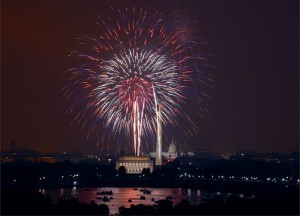
July 4th fireworks, Washington, D.C. Prints and Photographs Division
Happy Fourth of July! Today in 1776, the Continental Congress adopted the Declaration of Independence, declaring freedom of the 13 colonies from Great Britain.
The Library is home to the rough draft of the Declaration of Independence. A couple of years ago, thanks to the work of the Library of Congress’ Preservation Research and Testing Division, it was discovered that declaration author Thomas Jefferson had originally written the phrase “our fellow-subjects” in the portion of the document that deals with grievances against King George III, He apparently changed his mind, and over the word “subjects” he inked an alternative, the word “citizens.”
Jefferson, whose papers also reside here at the Library, marked his last Independence Day when he died on July 4, 1826.
You can also read more about the Declaration and other related material here.
Americans all over our nation celebrate with backyard barbecues, parades, fireworks, flag displays and more. I’ll actually be skating in the national Independence Day Parade here in D.C. and hopefully enjoying some fireworks later, although my days of Roman candle wars have come and gone. How will you celebrate?
I also thought it would be fun to give you a few facts and figures courtesy of the United States Census Bureau.
This Independence Day, the nation’s estimated population is more than 313 million, as compared with 2.5 million in 1776.
Last year, America imported more than $223 million worth of fireworks.
It’s likely that the burgers and steaks on your grill today came from Texas, which accounted for about one-sixth of the nation’s total production of cattle and calves in 2011. And if beef isn’t on the menu, it’s possible your hot dogs and pork sausages are coming from Iowa, which reported more than 19 million hogs and pigs as of March 1, 2012.
Want an extra dose of patriotism? Try visiting Eagle Pass, Texas; Independence, Mo., Patriot, Ind.; American Fork, Utah; or Iowa, specifically Libertyville, New Liberty, North Liberty and West Liberty.
July 3, 2012
Stars and Stripes Forever … Literally
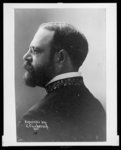
Mr. Sousa -- whose music can (and will) be played again and again
As we all prepare to take off for a midweek Fourth of July celebration that will feature hundreds, if not thousands, of bands around the nation playing John Philip Sousa marches including “Stars and Stripes Forever,” I’d like to thank my Dear Old Dad for his patience.
What’s that got to do with the price of piccolos in Poughkeepsie?
When I was six years old, back in the “Mad Men” era, we had a big Magnavox stereo in our living room and a decent collection of LP records. One of them featured John Philip Sousa’s “Stars and Stripes Forever” as played by Arthur Fiedler and the Boston Pops.
As little kids sometimes will, one evening I enjoyed hearing “Stars and Stripes Forever” so much that I asked my father to play it again. He obliged.
And then I asked him again.
And again.
And again.
And … at this point even I knew I was pushing my luck … again.
Well, after the sixth hearing he politely said we’d probably heard that particular piece enough for one night. And he left me with a lifetime appreciation of his parental patience … and the ability to whistle “Stars and Stripes Forever” in my sleep.
If you’d like to prep for whistling along with tomorrow’s live playings, here’s a recording of that piece as played by the March King’s own band, courtesy of the Library of Congress National Jukebox, a delightful site that streams vintage recordings from the Victor Records collection.
What’s your favorite patriotic band music?
Library of Congress's Blog
- Library of Congress's profile
- 74 followers



